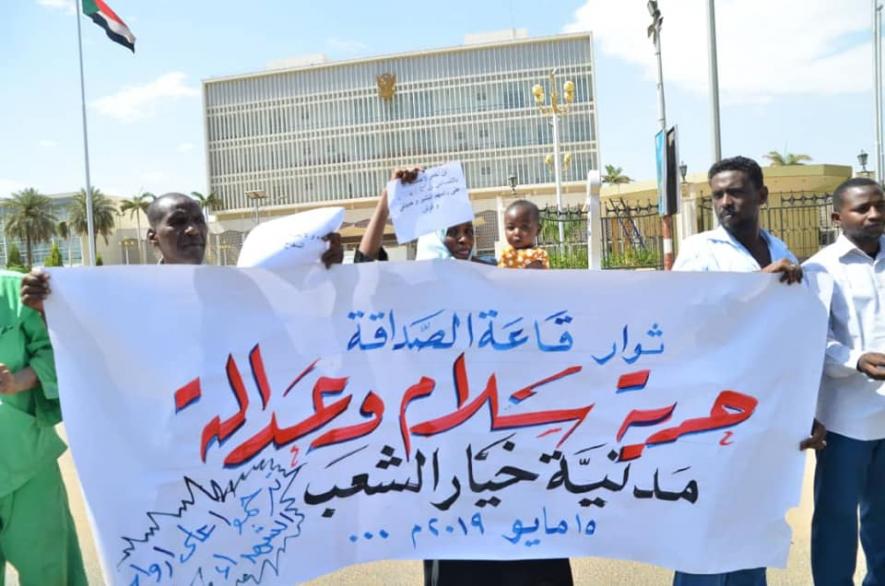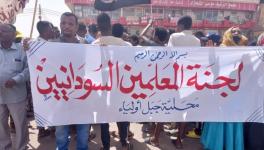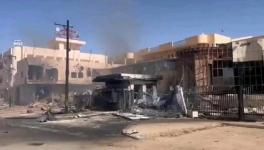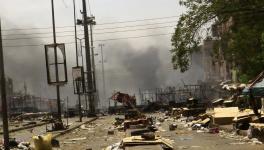Defying Threats, Workers in Sudan Ready to Embark on a Two-day General Strike

Workers sign the Revolutionary Attendance Notebook to join the strike and call for an end to military rule. Photo: Facebook
Employees of public and private companies across the primary, secondary and tertiary sectors in Sudan are set to go on a two-day political general strike on May 28 and 29, demanding a transition to civilian rule.
The military junta’s vice president warned that all workers participating in the strike will be fired and replaced with other staff who have already been arranged for. Despite the threats, employees of various government ministries have responded positively to the strike call given by the Sudanese Professionals Association (SPA), which has been spearheading the mass demonstrations that forced Omar al-Bashir of out presidency.
The SPA includes various organizations of lawyers, doctors, teachers, food industry workers, etc. It called for strike last week after the negotiations between the military junta and the Declaration of Freedom and Change Forces (DFCF), which is as a coalition of different opposition parties and the SPA, failed to achieve an agreement on transfer of power.
At these meetings, the Transitional Military Council (TMC) insisted that the majority of the members of sovereign council, that is to be constituted to head the country during the transitional period before calling elections, must be from the military. Furthermore, the TMC also insisted that the president would be from the military. The TMC has been the governing authority since Bashir’s removal last month.
The DFCF, which represents the protesters who have continued the mass demonstrations after ousting Bashir in order to wrest power from the military junta, refused to agree to this demand.
However, some sections within this coalition are willing to take a more conciliatory approach. Sadiq al-Mahdi, the head of the centrist National Umma Party, proposed that the DFCF should agree to let the military have the presidency, but the sovereign council should have a civilian majority.
Mahdi, who is the former prime minister ousted in the coup that had brought Bashir to power 30 years ago, did not play a leading role in organizing the mass-demonstrations against Bashir’s regime. It was only when enough momentum had built up that his party, which is the country’s largest opposition party, signed the Declaration of Freedom and Change and backed the protesters.
Mahdi also rejected the current strike call. However, despite such headlines as “top opposition rejects strike call”, the hundreds of thousands of protesters are not looking up to Mahdi as their leader.
The popular leadership evidently lies with the SPA, which has rejected compromises and floated what is being called the “Revolutionary Attendance Notebook,” that calls for a political strike against the military rule and an escalation to civil disobedience if necessary. The notebook is even being signed by employees previously not affiliated with the SPA.
The Sudanese Communist Party, which is backing the SPA, said in a statement, “The total stop of work across the country means the fall of the system, as it has happened before in the revolutions of the Sudanese people.”
The task of setting up strike committees in all the companies whose employees have signed the attendance is to be completed today. It is a crucial task in a country where all the independent trade unions were banned by Bashir in 1992, after which crony unions were set up by the regime to do its bidding and limit working class militancy.
Under the pressure of mass-demonstrations, a freeze was imposed on these regime-affiliated unions by the military junta after the army was forced to remove Bashir from office. Just as the strike plan was set on the agenda, the TMC canceled the freeze, allowing these crony unions to operate and use their assets.
However, this move, which is seen as a desperate attempt to confuse the working class, has not succeeded in putting brakes on the strike preparations. The Revolutionary Attendance Notebook signature campaign will continue till the end of the day.
Employees who have already signed up held vigils across the country to show their readiness to participate in the industrial action and to intensify it to a civil disobedience campaign if necessary.
Radio Dabanga reported on Friday that, apart from private sector employees, those who held protest vigils included the employees of the Central Bank of Sudan, the Standards and Metrology Organization, the National Water Corporation, the Ministry of Information, the Ministry of Labor, the Central Bureau of Statistics, the Tax Department, and various oil and electricity companies.
An awareness campaign about the need for civil disobedience will be organized simultaneously with the strike. On its second day, committees will be set up in neighborhoods to coordinate the civil disobedience.
The strike will be lifted on May 30, after which the employees will march in processions to the mass-demonstrations that have been surrounding the army headquarters in the capital city of Khartoum as well as various government offices in different towns and cities across Sudan.
Get the latest reports & analysis with people's perspective on Protests, movements & deep analytical videos, discussions of the current affairs in your Telegram app. Subscribe to NewsClick's Telegram channel & get Real-Time updates on stories, as they get published on our website.
























